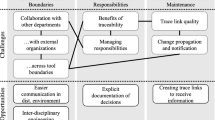Abstract
Product Family Engineering (PFE) is an approach to software engineering that seeks to reduce the global effort in producing multiple software products by actively promoting and governing the reuse of assets between the family members. However, PFE is highly demanding, putting stringent demands on careful planning and management in the organization. To leverage the full opportunities offered by PFE, its introduction and use requires effective coordination of people and organizational units. This paper presents a solution to support this coordination by exploring concepts from the area of communities of practices for PFE. The expected benefit is that communities offer a more adaptive approach supporting the transition towards PFE compared to formal organizational restructuring. In this paper, we will describe our considerations about the building principles for organizations using a shared platform for the family members and a study proposal that will examine the effects of knowledge brokering among Communities of Practice as a means to assist PFE.
Preview
Unable to display preview. Download preview PDF.
Similar content being viewed by others
References
Linden, F.v.d.: Software product families in Europe: The ESAPS and CAFÉ projects. IEEE Software 19(4), 41–49 (2002)
Wenger, E.C.: Communities of Practice: Learning, meaning and identity. Cambridge University Press, Cambridge (1998)
Clements, P., Northrop, L.: Software product lines: Practices and Patterns. The SEI series in software engineering, vol. 563. Addison Wesley, Reading (2002)
Muthig, D.: A Light-weight Approach Facilitating an Evolutionary Transition Towards Software Product Lines. Fraunhofer IRB Verlag, Stuttgart (2002)
Bühle, S., et al.: Exploring the context of product line adoption. In: Linden, F.V.d. (ed.) 5th International workshop on Product Family Engineering, Siena, Italy. Springer, Heidelberg (2003)
Hallsteinsen, S., Fægri, T.E., Syrstad, M.: Patterns in Product Family Architecture Design. In: Linden, F.V.d. (ed.) 5th International workshop on Product Family Engineering, Siena, Italy. Springer, Heidelberg (2003)
Mustapic, G.: Real World Influences on Software Architecture - Interviews with Industrial System Experts. In: WICSA-4, Oslo, Norway (2004)
Lago, P., Vliet, H.: v.: Observations from the Recovery of a Software Product Family. In: Third Software Product Line Conference. Springer, Heidelberg (2004)
Wenger, E.C.: Communities of practice: A brief introduction
Wenger, E.C., McDermott, R., Snyder, W.M.: Cultivating Communities of Practice. Hardvard Business School Press, Boston (2002)
Becker, M.: Anpassungsunterstützung in Software-Produktfamilien, in Technical Universität of Kaiserslautern, Department of Computer Science (2004)
Kim, A.J.: Community Building. Strategien für den Aufbau erfolgreicher Web-Communities. Galileo Press, Bonn (2001)
Fenton, N., Neil, M.: Software metrics: A roadmap. In: Finkenstein, A. (ed.) The future of software engineering. ACM Press, New York (2000)
Seaman, C.B.: Qualitative Methods in Empirical Studies of Software Engineering. IEEE Transactions on Software Engineering 25(4), 557–572 (1999)
Bosch, J.: Organizing for Software Product Lines. In: Third International Workshop on Software Architectures for Product Families (2000)
Bosch, J.: Software Product Lines: Organizational Alternatives. In: Proceedings of the 23rd International Conference on Software Engineering. IEEE Computer Society Press, Los Alamitos (2001)
Schmid, K.: People Managemement in Institutionalizing Product Lines. In: Proceedings of Net Object Days (2003)
Toft, P., Coleman, D., Ohta, J.: A Cooperative Model for Cross-Divisional Product Development for a Software Product Line. In: Donohoe, P. (ed.) Proceedings of the First Software Product Line Conference. Kluwer Academic Publishers, Dordrecht (2000)
Millen, D.R., Fontaine, M.A., Muller, M.J.: Understanding the benefits and costs of communities of practice. Communications of the ACM, 2002 45(4), 69–73 (2002)
Author information
Authors and Affiliations
Editor information
Editors and Affiliations
Rights and permissions
Copyright information
© 2005 Springer-Verlag Berlin Heidelberg
About this paper
Cite this paper
Fægri, T.E. et al. (2005). Exploring Communities of Practice for Product Family Engineering. In: Althoff, KD., Dengel, A., Bergmann, R., Nick, M., Roth-Berghofer, T. (eds) Professional Knowledge Management. WM 2005. Lecture Notes in Computer Science(), vol 3782. Springer, Berlin, Heidelberg. https://doi.org/10.1007/11590019_12
Download citation
DOI: https://doi.org/10.1007/11590019_12
Publisher Name: Springer, Berlin, Heidelberg
Print ISBN: 978-3-540-30465-4
Online ISBN: 978-3-540-31620-6
eBook Packages: Computer ScienceComputer Science (R0)




